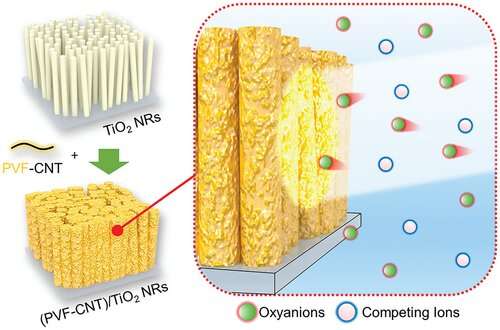This article has been reviewed according to Science X's editorial process and policies. Editors have highlighted the following attributes while ensuring the content's credibility:
fact-checked
peer-reviewed publication
trusted source
proofread
Renewable solar energy can help purify water, research shows

Using electrochemistry to separate different particles within a solution (also known as electrochemical separation) is an energy-efficient strategy for environmental and water remediation: the process of purifying contaminated water. But while electrochemistry uses less energy than other, similar methods, the electric energy is largely derived from nonrenewable sources like fossil fuels.
Chemists at the University of Illinois Urbana-Champaign have demonstrated that water remediation can be powered in part—and perhaps even exclusively—by renewable energy sources. Through a semiconductor, their method integrates solar energy into an electrochemical separation process powered by a redox reaction, which manipulates ions' electric charge to separate them from a solution like water. This work appears in the journal Small.
Using this system, the researchers successfully separated and removed dilute arsenate—a derivative of arsenic, which is a major waste component from steel and mining industries—from wastewater.
This work represents proof-of-concept for the applicability of such systems for wastewater treatment and environmental protection.
"Global electrical energy is still predominantly derived from nonrenewable, fossil-fuel-based sources, which raises questions about the long-term sustainability of electrochemical processes, including separations. Integrating solar power advances the sustainability of electrochemical separations in general, and its applications to water purification benefit the water sector as well," said lead investigator Xiao Su, a researcher at the Beckman Institute for Advanced Science and Technology and an assistant professor of chemical and biomolecular engineering.
More information: Ki‐Hyun Cho et al, Redox‐Functionalized Semiconductor Interfaces for Photoelectrochemical Separations, Small (2023). DOI: 10.1002/smll.202305275



















